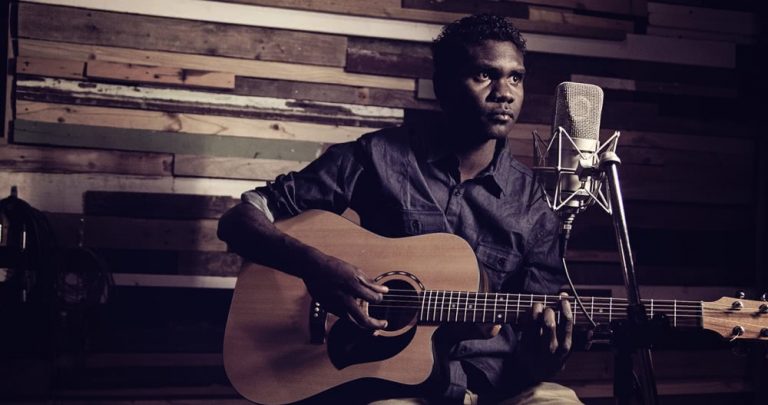It’s no secret that Aboriginal cultures rely heavily on the traditions of family, with generation after generation passing down stories and customs, often utilising music and song to document their extensive and colourful histories. Black Arm Band’s mission is to do just that: preserve and educate through musical communication. For a decade, the group has been sharing stories from the heart of indigenous life, playing a role in pioneering new talent. And now, the country’s leading Aboriginal music collective is gearing up for a tenth anniversary celebration at City Recital Hall.
Yirrmal Marika is just one of the young talents set to appear at the anniversary event. Hailing from Yirrkala in Arnhem Land, Marika has performed with Black Arm Band around Australia and overseas. He says they’ve always been welcomed warmly, especially in multicultural cities like Sydney.
It is very important to learn for the First Nations, our history of song rites – it’s like the constitutions of our lore.
“The audience, the response is positive,” Marika says. “We actually feel the land and connected to the land, and the fine lines of the songs of the creation times. We wanted to share [these] songs into a non-indigenous people and share that moment as well from the top surface that we feel of the Mother Earth.
“It is very important to learn for the First Nations, our history of song rites – it’s like the constitutions of our lore, and that’s what we are. The people receive that experience in that music.”
Black Arm Band’s music is so intrinsically connected with land and tradition, it’s a wonder whether Marika and his fellow performers ever feel a sense of disconnect from their native land when they’re touring overseas. “We went to Taiwan and Singapore, and of course my culture is still standing strong and all my generations is still receiving that knowledge in Yirrkala country, my [most] special country in probably the whole part of Australia. You feel deeper when you come to play Yirrkala, because elders [have] fought against that for this generation so we can keep carrying our culture.
“What I’m saying is, why the culture [is] so strong is because we [are] very, very strong in our culture – when I perform places like that, when I first performed in Taiwan, say, they were Taiwanese people, they have a culture as well, and when I sang in my language, they actually connected with it.”
And while Black Arm Band’s performances draw heavily on past traditions, they’re not bound to history. Marika explains that his own music is a marriage of what’s been passed down to him and what he’s experienced in his own lifetime.
“I listen to a lot of Western musics,” he says. “All indigenous music across Australia, it’s same-same, y’know? For me, [it’s important] to have two cultures – indigenous culture and Western kind of music – and blend them into two, to make it more deeper, earthy sound.”
Now is as good a time as any to familiarise yourself with Marika’s work, as he’s ambitious to pursue a successful career in music.
“Still more to come, songwriting,” he says. “Mostly I want to study very hard on poetry stuff, to learn with Uncle Shane Howard, so he will teach me the songwriting so the people will listen and taste our lyrics, you know? Like the putting the ingredients on the food.” ■
[Yirrmal Marika photo by Carlos Santone]
Yirrmal Marika performs Songs Of The Black Arm Band on Saturday April 22 at the City Recital Hall.



































